| Reviews & Columns |
|
Reviews DVD TV on DVD Blu-ray 4K UHD International DVDs In Theaters Reviews by Studio Video Games Features Collector Series DVDs Easter Egg Database Interviews DVD Talk Radio Feature Articles Columns Anime Talk DVD Savant Horror DVDs The M.O.D. Squad Art House HD Talk Silent DVD
|
DVD Talk Forum |
|
|
| Resources |
|
DVD Price Search Customer Service #'s RCE Info Links |
|
Columns
|
|
|
Lost and Found: The Harry Langdon Collection
There were three unarguable geniuses in silent comedy: Charlie Chaplin, Harold Lloyd, and Buster Keaton. They all started out in shorts and quickly graduated to feature films, something that was fairly difficult for silent screen clowns. To keep an audience laughing through a 20-minute two-reeler was one thing, but to sustain that laughter for well over an hour was something all together. There were many talented comics who never made the jump to features, and some that did, such as Larry Semon, soon found themselves back in shorts when their longer pictures bombed.
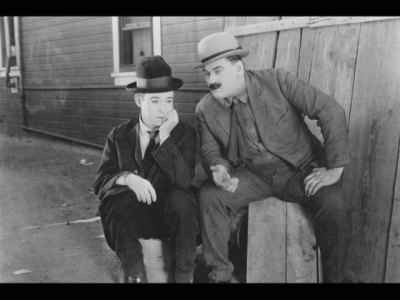 There was one other comic who had a string of successful features. A man who was compared more than once to Chaplin and who Mack Sennett famously said was the best comedian he ever saw. In his seminal book "The Silent Clowns", author Walter Kerr devoted three chapters to this performer, but today he's all but forgotten. The man? Harry Langdon. While Keaton, Chaplin, and Lloyd have most of their films out on DVD, there has only been one disc devoted to Langdon (which contained his first three independent features: Tramp, Tramp, Tramp, The Strong Man, and Long Pants) along with a couple of shorts included in various collections. This has been corrected with the release of Harry Langdon: Lost and Found a magnificent four disc set that contains 20 of this forgotten clown's films along with copious supplemental material.
There was one other comic who had a string of successful features. A man who was compared more than once to Chaplin and who Mack Sennett famously said was the best comedian he ever saw. In his seminal book "The Silent Clowns", author Walter Kerr devoted three chapters to this performer, but today he's all but forgotten. The man? Harry Langdon. While Keaton, Chaplin, and Lloyd have most of their films out on DVD, there has only been one disc devoted to Langdon (which contained his first three independent features: Tramp, Tramp, Tramp, The Strong Man, and Long Pants) along with a couple of shorts included in various collections. This has been corrected with the release of Harry Langdon: Lost and Found a magnificent four disc set that contains 20 of this forgotten clown's films along with copious supplemental material.
Harry Langdon had show-biz in his blood. He ran away from home at the age of 12 to join Dr. Belcher's Kickapoo Indian Medicine Show (an experience that possibly provided fodder for his short Lucky Star included in this set) and was a seasoned and successful vaudeville actor. He started in the movies rather late in his career, not making his first film until 1923 when he was nearly 40. After a couple of quick shorts for producer Sol Lesser (both lost films), Mack Sennett bought Langdon's contract in 1924 and started him on his way to stardom. By 1926 Langdon had developed his character, acquired a creative team that knew how to write and direct him (these included director Harry Edwards and writers Frank Capra (yes, the Frank Capra) and Arthur Ripley), and released a string of increasingly popular shorts.
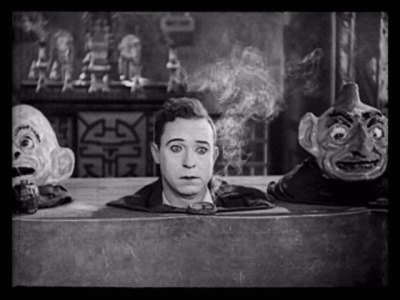 As many other comics did before him, Langdon outgrew Sennett's studio. In 1926 he signed a contract with First National and became an independent producer. He took his staff of Edwards, Capra, and Ripley with him. According to his agreement, he had to provide two features per year for three years and he would be paid a set amount for each one. His first, Tramp, Tramp, Tramp, was a big hit, but it was significantly over budget and so director Harry Edwards was fired. The next film, The Strong Man, was directed by Capra and is considered Langdon's best. It also did well at the box office. With his third feature, Long Pants, (which also did respectable business at the box office) Langdon and Capra had a falling out. Langdon fired Capra and decided to write, direct, and star in his films from then on, just as Charlie Chaplin had done.
As many other comics did before him, Langdon outgrew Sennett's studio. In 1926 he signed a contract with First National and became an independent producer. He took his staff of Edwards, Capra, and Ripley with him. According to his agreement, he had to provide two features per year for three years and he would be paid a set amount for each one. His first, Tramp, Tramp, Tramp, was a big hit, but it was significantly over budget and so director Harry Edwards was fired. The next film, The Strong Man, was directed by Capra and is considered Langdon's best. It also did well at the box office. With his third feature, Long Pants, (which also did respectable business at the box office) Langdon and Capra had a falling out. Langdon fired Capra and decided to write, direct, and star in his films from then on, just as Charlie Chaplin had done.
Langdon's film career came crashing down as quickly it had risen. His next three films were all flops and First National refused to renew his contract when it was up. Unable to find other work, he signed on with Hal Roach and made eight sound films, none of which captured his earlier glory. For a while he ended up making cheap two-reelers at Educational, as Buster Keaton also did, and then got a job at Columbia. He also starting writing and penned Block-heads,Flying Deuces, and others for Laurel and Hardy, which only seems natural since Stan Laurel's character owes a lot to Langdon's. Harry Langdon died in 1944.
The films in this set collect all of the surviving films that Langdon made while with Sennett from 1924-1926. This is a unique and interesting group of films since it's possible to see Langdon's character evolve over time. The first couple of movies are pretty standard Sennett comedies, relying on mechanical gags, animation, and bathing beauties to keep an audiences attention. After those however you start to see something odd emerge: a comedian who is not in a hurry. As where other comedians were always rushing about, being chased by the police or frantically trying to get out of a jam, Langdon takes the opposite approach: he slows things down. You could almost describe him as a minimalist comic: one who does nothing to get a laugh.
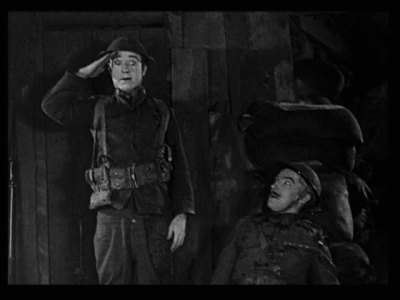 Part of comedy is the unexpected.... When something unusual happens it can be funny. That's where Langdon lived: in doing what the audiences didn't expect. By the time he was making these shorts (1926-27) movie goers had come to fully understand slapstick comedy. There were certain rules that were followed and viewers came to expect frantic action. That's where Harry got them. When stuck in the middle of No Man's Land, his shirt caught on some barbed wire, Harry finds a live hand grenade that's about to go off. Instead of panicking the child-like Langdon doesn't even realize what it is, picks it up, and tries to use the grenade to free himself from the wire. Langdon always had this look on his face like he didn't really know what was going on, as if everything was foreign to him. It's this babe-in-the-woods who doesn't react the way he's expected to that makes his films so hilarious.
Part of comedy is the unexpected.... When something unusual happens it can be funny. That's where Langdon lived: in doing what the audiences didn't expect. By the time he was making these shorts (1926-27) movie goers had come to fully understand slapstick comedy. There were certain rules that were followed and viewers came to expect frantic action. That's where Harry got them. When stuck in the middle of No Man's Land, his shirt caught on some barbed wire, Harry finds a live hand grenade that's about to go off. Instead of panicking the child-like Langdon doesn't even realize what it is, picks it up, and tries to use the grenade to free himself from the wire. Langdon always had this look on his face like he didn't really know what was going on, as if everything was foreign to him. It's this babe-in-the-woods who doesn't react the way he's expected to that makes his films so hilarious.
That's also his downfall. Many modern audiences won't get Langdon's style since they aren't familiar with the slapstick conventions. His lack of action can easily be confused for lack of comedy, but nothing could be further from the truth. His carefully timed movements, jumping a split second after a car nearly hits him rather than before, are wonderfully humorous.
While I'll admit I was unimpressed with the first couple of shorts in this set, those that were done before Sennett really knew what to do with his new star, after Langdon teams up with director Harry Edwards on Luck of the Foolish things start to pick up considerably. One of the highlights of the set is Feet of Mud. This movie contains a couple of routines that are priceless including Harry fighting a mannequin and a scene where he tries to take a large push-broom onto the subway.
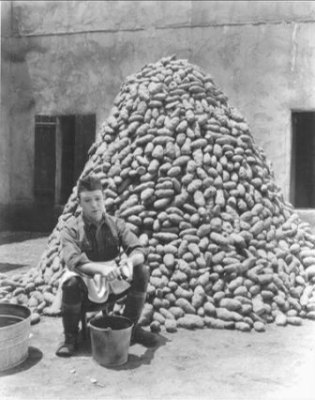 My favorite film in this collection however is All Night Long. Told in a unique style the film is both interesting and funny. Harry nods off while watching a movie in a theater and wakes to find the place empty. Stumbling around he encounters three dangerous criminals who are trying to break into the theater's safe. It looks like Harry's in trouble until one of the men (Vernon Dent who plays his foil in many of these films) recognizes him. They were stationed in France together during the war, and the two men start to reminisce about their times together. Told through flashbacks, the war scenes are really funny, especially Harry's reaction when Dent's French girlfriend greats him with a kiss. The end was hilarious and satisfying.
My favorite film in this collection however is All Night Long. Told in a unique style the film is both interesting and funny. Harry nods off while watching a movie in a theater and wakes to find the place empty. Stumbling around he encounters three dangerous criminals who are trying to break into the theater's safe. It looks like Harry's in trouble until one of the men (Vernon Dent who plays his foil in many of these films) recognizes him. They were stationed in France together during the war, and the two men start to reminisce about their times together. Told through flashbacks, the war scenes are really funny, especially Harry's reaction when Dent's French girlfriend greats him with a kiss. The end was hilarious and satisfying.
The set ends up with a couple of shorts that Langdon made in the 30's. It was great to see these, but honestly they pale in comparison to his other work on this set. It would have been nice to see his last three features that he made for First National too, but I assume there's a problem with the copyrights. Even without those, this is a very nice set that amply illustrates why Langdon was so popular in the late 20's.
This set contains the following films:
Disc One:
Picking Peaches Feb 3, 1924 • 21:30
Smile Please March 2, 1924 • 18:32
His New Mamma June 22, 1924 • 15:15
-Partial restoration using source material from Getty Images, Lobster Films, and David Kalat
The First 100 Years Aug 17, 1924 • 13:19
-Partial restoration using source material from Lobster Films
Luck o' the Foolish Sept 14, 1924 • 21:13
The Hansom Cabman Oct 12, 1924 • 19:25
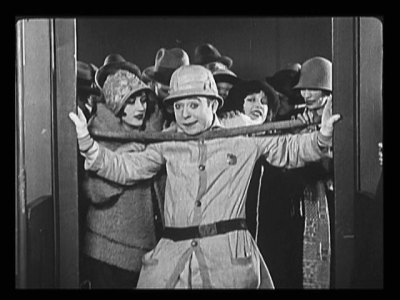 Disc Two:
Disc Two:
All Night Long Nov 9, 1924 • 19:29
Feet of Mud Dec 7, 1924 • 17:34
The Sea Squawk Jan 4, 1925 • 18:42
Boobs in the Wood Feb 1, 1925 • 19:52
His Marriage Wow Mar 1, 1925 • 20:39
Plain Clothes March 29, 1925 • 15:47
Remember When April 26, 1925 • 19:04
Disc Three:
Lucky Stars Aug 16, 1925 • 21:24
Saturday Afternoon Jan 31, 1926 • 27:12
Fiddlesticks April 1, 1926 • 19:55
Soldier Man May 1, 1926 • 31:13
His First Flame May 3, 1927 • 44:36
-The first feature Harry Langdon made, but not released until after LONG PANTS
Disc Four:
Knight Duty May 7, 1933 • 21:03
Hooks and Jabs Aug 25, 1933 • 18:31
Love, Honor and Obey (the Law) 1935 • 21:31
The DVD:
This four disc set collects 20 Langdon movies (mostly two-reelers) and assorted bonus material (including a feature length bio-pic) on four DVDs. These come in a very attractive hardcover DVD 'book". There are two DVD on each side of the opened book, but two are on flip-up pages so the discs don't overlap. (I hate that.) There's also a nice 20-page booklet that includes ten essays on Langdon as well as a listing of the films in the set and credits. This is a very attractive package that looks nice on a DVD shelf.
Audio:
These films come with musical scores provided by the Snark Ensemble. (With the exception of the feature His First Flame which has a piano accompaniment by Franklin Stover, and the Redwine Jazz Band who accompanied His Marriage Wow.) A majority of the scores were written but two members of the Ensemble, Andrew Simpson and Maurice Saylor and were very good overall. I found a couple of the choices a bit odd, such as the Theremin used at the beginning of Lucky Stars, but this was the exception rather than the rule. The group also uses some electric instruments, which some purists object to, but I didn't mind. Their sound is rather unique in that they employ some instruments (at various times) that you wouldn't expect to hear such as an accordion. I would have gone for a more minimalist approach myself, but this works too. The scores did match the action on screen and did a good job of keeping the films lively and entertaining. Some sound effects were added in some films, mainly bells and wooden claps, but these weren't overdone. A nice set of music that does a good job matching the tone of these movies.
Video:
Since these movies have been digitally restored from original negatives and archival prints the full frame image looks very good, especially for films this old. While the quality does vary some, generally the movies all have a good amount of detail, fine contrast and only minimal print damage (for 80 year old films.) There are scratches and some dirt along with the occasional missing frame but these are almost never distracting. There is a fair amount of digital noise and the films are generally on the soft side, but the set looks much better than I was expecting it to.
Extras:
The producers of this set managed to dig up a good number of extras to include.
The first disc starts off with a surviving fragment from Horace Greely, Jr. a short Langdon made before signing with Sennett. There's also a pair of clips from Funny Mann, a syndicated show similar to Fractured Flickers where silent films are re-edited and put to music. The clips present two Langdon shorts, His New Mamma (from show 4) and Luck 'O the Foolish (from show 68.) There's also a Sennett short from 1927, Catalina, Here I Come. In this film Sennett tries to mold Eddie Quillan into another Harry Langdon. It's an interesting short and I'm glad they included it.
Disc two has a one-reel condensation of Remember When entitled Lost and Found as well as a photo gallery. On the third DVD there's a one-reel digest version of Saturday Afternoon as well as a pdf copy of the press kit for Langdon's feature Heart Trouble. This is viewable on a computer equipped with a DVD-ROM drive.
On the last disc there's a treasure trove of material. First off is Lost and Found a 75-minute biography of Langdon that is very informative and well done. Various film historians discus the baby-faced comic and his place in silent film comics. It's a very good documentary, filled with astute observations about Langdon. The only noticeable absence is a lack of footage from Langdon's three successful features Tramp, Tramp, Tramp, The Strong Man, and Long Pants. Though much of the information is also contained in the commentaries this show would be a nice introduction to Langdon.
Next is a seven minute promo reel from 1929 that was never screened for the public where Hal Roach welcomes Harry Langdon to the "Lot of Fun". Then there are two Langdon cameos in Voice of Hollywood (1930) and Hollywood on Parade (episode 4), as well a Langdon lip-synching to a song in Beautiful Girls. Wrapping up the collection is a six-minute reel of Langdon home movies.
There are also audio commentaries to all of the films as well. Richard M. Roberts is my favorite of the bunch, but Ben Model, Steve Massa, Bruce Lawton, Robert Arkus, David Kalat, Wayne Powers, Ed Watz, Ken Gordon, and Hooman Mehran also provide their thoughts (both solo and in groups.) These were very educational, and though there was a fair amount of repetition between some of the commentaries they were all fun to listen to. Not only were the supporting actors identified and discussed but there was a good deal of information on Langdon (naturally), who was really responsible for creating Langdon's personality, and they even found time to talk about the films too. A fun set of commentaries all around.
Final Thoughts:
This is a great set. Not only does it present the rarely seen films that Langdon made while at Sennett, but it also has some of his talkie shorts and ample bonus material. Langdon was a wonderful comic, but he's not for everybody. People who haven't seen a lot of silent comedies should probably work their way through Lloyd, Chaplin, and Keaton first in order to be able to understand Langdon's style of comedy. For the many silent movie fans that are well versed in slapstick however, I heartily recommend this set. Highly recommended.
|
| Popular Reviews |
| Sponsored Links |
|
|
| Sponsored Links |
|
|
| Release List | Reviews | Shop | Newsletter | Forum | DVD Giveaways | Blu-Ray | Advertise |
|
Copyright 2024 DVDTalk.com All Rights Reserved. Legal Info, Privacy Policy, Terms of Use,
Manage Preferences,
Your Privacy Choices | |||||||













